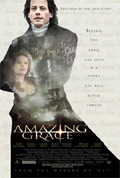You are here: Reports » Phase 1: media » Reviews » Amazing Grace
Amazing Grace
Year: 2007
Directed: Michael Apted
Production: Ingenious Films

Amazing Grace portrays the life and work of the British politician and abolitionist campaigner William Wilberforce. The film concentrates on the period between the 1780s and the early 1800s, during which Wilberforce was involved in the movement to abolish the trade in enslaved Africans. Featuring a number of high-profile British actors, including Michael Gambon and Tom Courtney, Amazing Grace is a skilfully-filmed period drama.
The well-shot scenes of the film however betray a wealth of inaccuracies both in its story line and in historical fact. The film drifts between past and present, at the outset the film establishes Wilberforce as a character deserving of sympathy and support, the audience witnesses the reverence which others hold for him and his evident illness; the great cause for which he has laboured and now suffering for is then revealed and this sympathy is affirmed. The disjointed nature of the plot ensures a number of aspects of the characters of Wilberforce and others are unexplained. This absence in the plot of character development ensures that individuals appear disingenuous. This however may not have necessarily been a great loss to the film as the appearance of other characters seems to serve the purpose of only reflecting the greatness of the character of Wilberforce. The opening scenes in the rain-soaked English countryside, of an ill Wilberforce putting his health at risk to save a notably black horse from a savage beating from its masters, sets the film's agenda as an uncritical homage to the abolitionist. The two simple, working class countryside men give up punishing the animal when one recognises Wilberforce. The mere mention of the name causes the men to reel back in admiration and acceptance of his orders. Wilberforce is venerated as a flawless character throughout Amazing Grace. Any characteristics which might appear to detract from his greatness, such as his opium addiction or his failure to get the Abolition Bill passed, is shown as either forced upon him or the result of his betrayal by others. This almost messianic portrayal is encapsulated in an early dream sequence where a shining Wilberforce throws over the tables of the Members of Parliament who had prevented the latest attempt to get the Abolition Bill through the Commons. Christian imagery and ideology are forever present throughout the film, which is perhaps to be expected due to the prominent place Wilberforce's evangelicalism is given, though at times it appears awkward and forced. Wilberforce is told, 'marriage and health are twins'; on his deathbed Pitt tells Wilberforce, 'I wish I had your faith'; and Equiano describing the branding of slaves says it is conducted, 'to let you know you no longer belong to God but to a man.'
The historical inaccuracies are quite blatant and worryingly seem to be made to further highlight the 'saintly' nature of Wilberforce. Individuals such as Clarkson and Equiano are seemingly given prominent roles, but in reality they are discredited as Wilberforce remains the only 'pure saint.' Clarkson is shown to be perhaps too fond of drink, his nervous breakdown is described as having, 'found a cottage to hide away in', whilst the authenticity of Equiano's narrative is questioned hundreds of years before scholarship began to suggest that his work might not be an accurate reflection of actual experience. The criticisms of Wilberforce which have emerged in recent years regarding his views on the working classes and the rights of women are rebutted in this film, as he is shown to encourage his feisty, young wife and to exclaim in Parliament that the voice of 'the people' must be heard. Perhaps the most glaring inaccuracy is the moment when James Stephenson, on his return from Jamaica, translates a Latin phrase to an audience consisting of Thomas Clarkson, whose Latin essay on the inhumanity of slavery two decades earlier fuelled his own commitment to abolitionism. The obvious defence to these accusations that the film is not intended to be historically accurate but a dramatic representation is insubstantial. The film assumes a historical basis as it uses documents and records of the time; is dramatic license therefore no more than an activity that can be resorted to whenever the necessity is felt, or a defence to be retreated behind? This blinkered approach to history made by the film is evidenced by the absence of those that Wilberforce is shown to be fighting for. Apart from momentary glimpses of horror seen by Wilberforce, the enslaved Africans and their fight for freedom is neglected, or even suggested to be inspired by Wilberforce himself. The sheer incongruity of ascribing a revolution to a man that later refuses to have the word mentioned in his presence was apparently not considered. Combined with the appearance of a simple, docile but loyal working class, the film thereby relies on stereotypes rather than build complex characters. Amazing Grace is by no means an accurate portrayal of the British abolitionists before the 1807 Abolition Act. Its biased approach to the subject matter is so evident that history seems to be an inconvenience.
